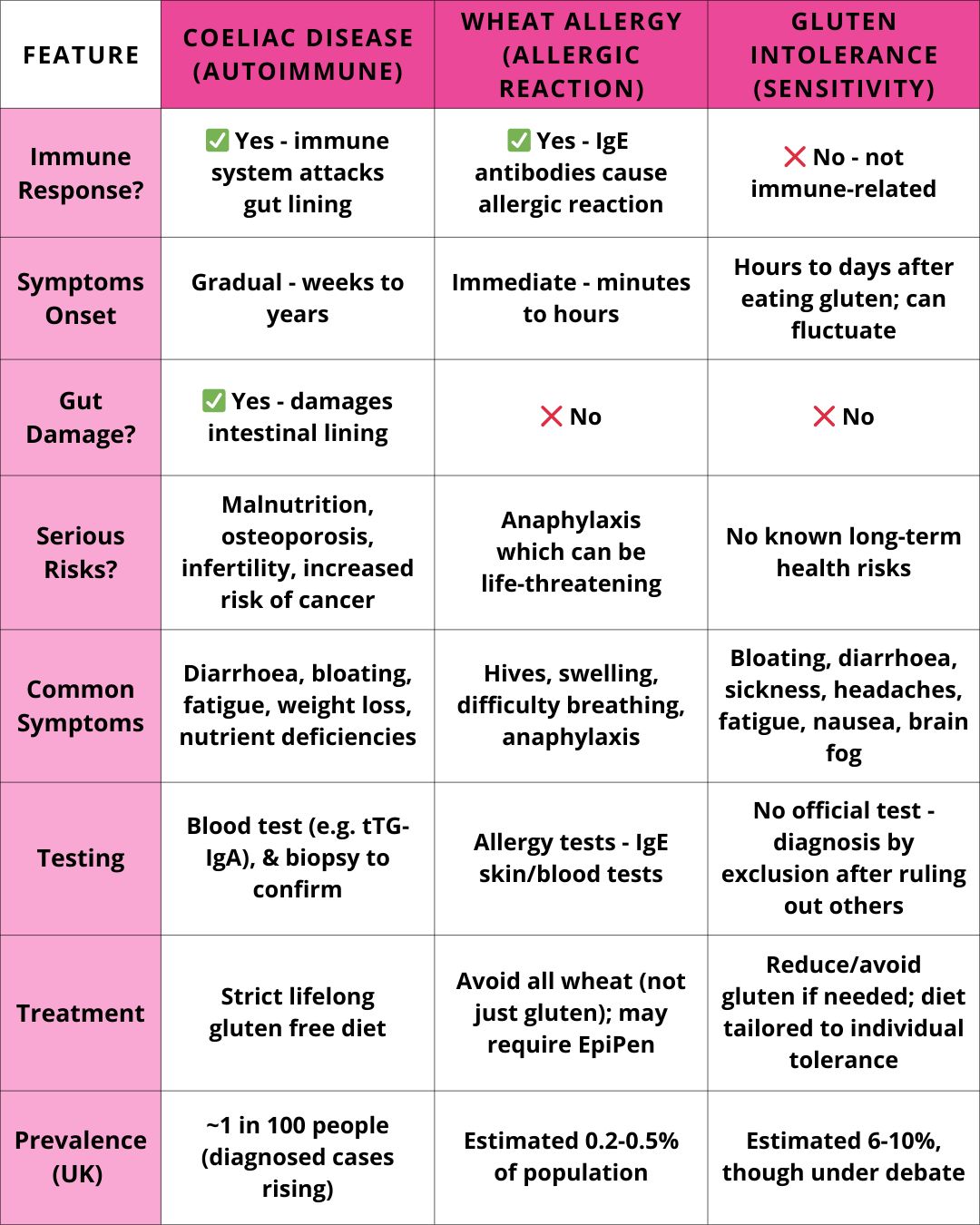Non-Coeliac Conditions
A guide to non-coeliac reasons for avoiding gluten



❓ Why Go Gluten Free Without Coeliac Disease?
When most people think of a gluten free diet, they assume it's because of coeliac disease - a serious autoimmune condition that requires lifelong gluten avoidance.
But coeliac disease is just one piece of the puzzle.
Many people follow a gluten free diet for other reasons - and their need to avoid gluten is just as valid and life changing as coeliac disease.
This guide introduces the three main reasons people go gluten free outside of coeliac disease, and sets the stage for exploring each in more detail.
💡 Why This Matters
There's a lot of misunderstanding around gluten free diets. People who avoid gluten - but don't have coeliac disease - are sometimes seen as following a 'trend' or doing it for no real reason.
But in reality, there are a range of legitimate medical reasons someone might avoid gluten. By understanding the basics, we can challenge misconceptions, improve awareness, and encourage more thoughtful conversations around food choices.
🧩 The Three Main Non-Coeliac Reasons for Going Gluten Free
Here's an overview of the three most common categories:
1️⃣ Gluten Intolerance/Non-Coeliac Gluten Sensitivity (NCGS)
This is when someone experiences uncomfortable symptoms after eating gluten - even though they don't have coeliac disease or a wheat allergy. This condition is often referred to as Non-Coeliac Gluten Sensitivity or Gluten Intolerance.
Common symptoms include:
- 🎈 Bloating, cramping, or digestive discomfort
- 💤 Brain fog and fatigue
- 🤕 Headaches
- 🦵🏽 Mood changes or joint pain
Unlike coeliac disease, NCGS doesn't cause damage to the gut lining, and the severity of symptoms can vary from person to person.
📊 How common is it?
Estimates suggest that between 3% and 13% of the population may have NCGS, with some studies pointing to around 6% being the most likely figure. It's a diagnosis of exclusion, which means it's usually identified once coeliac disease and wheat allergy have been ruled out.
👉🏼 Learn more about gluten intolerance and NCGS
2️⃣ Wheat Allergy
A wheat allergy is a type of immune response in which the body reacts to proteins in wheat - including, but not limited to, gluten. It's more common in children but can occur in adults as well.
Symptoms can include:
- 💥 Skin reactions (like hives or swelling)
- 🤢 Gastrointestinal discomfort
- 🫁 Breathing difficulties
- ⚠️ In severe cases, anaphylaxis
Unlike coeliac disease or NCGS, wheat allergy is a classic IgE-mediated allergy and can be confirmed through allergy testing.
📊 How common is it?
Wheat allergy affects about 0.2% to 0.5% of UK adults. It may be more common in early childhood, with some individuals outgrowing it over time.
People with wheat allergy need to strictly avoid all forms of wheat - not just the gluten protein in wheat - and depending on the severity, this may include gluten-containing grains like barley and rye.
👉🏾 Read more about wheat allergy and related conditions
3️⃣ Other Medical Conditions
In some cases, people may go gluten free as part of managing another diagnosed health condition, even though gluten isn't necessarily the root cause.
Some examples include:
- 💩 Irritable Bowel Syndrome (IBS) - Up to 10-25% of people with IBS report symptom improvement on a gluten free or low-FODMAP diet
- 🤒 Autoimmune conditions - People with Hashimoto’s thyroiditis, rheumatoid arthritis, or lupus often self-report symptom relief on a gluten-free diet, though research is ongoing
- 🧠 Neurological conditions - Conditions like gluten ataxia, migraines, ADHD, and even epilepsy have been linked in some cases to gluten sensitivity
- 🥵 Hormonal & inflammatory conditions - Anecdotal and emerging evidence suggests people with endometriosis, PCOS, fibromyalgia, and chronic fatigue syndrome may benefit from reducing gluten, especially during flare-ups
These connections are still being researched, and symptom response varies widely. However, many people explore gluten free living through elimination diets to see what works best for their body.
👉🏼 Explore other medical reasons linked to gluten free diets
👀 Here's a Visual Guide Explaining Key Differences

🆚 The Differences in Managing Gluten Free Diets
Living gluten free looks different depending on the reason behind it. For people with coeliac disease, even tiny traces of gluten can trigger serious health issues - meaning strict avoidance and cross-contamination precautions are essential.
But for those with gluten intolerance, wheat allergy, or other medical reasons, there may be more flexibility in how gluten is managed.
Here are a few key areas where approaches can differ:
- 🍽️ Eating out
- 🛒 Supermarket shopping
- 🍳 Cooking at home
- ⚠️ Cross-contamination
- 👋🏽 Reintroducing gluten
👉🏾 Read more about the differences in managing gluten free conditions
🎯 Quick Recap:
There’s more than one reason to avoid gluten - and not everyone who’s gluten free has coeliac disease.
By learning about these other conditions, we create more space for understanding, respect, and support - whether someone’s gluten free by necessity, exploration, or medical advice.